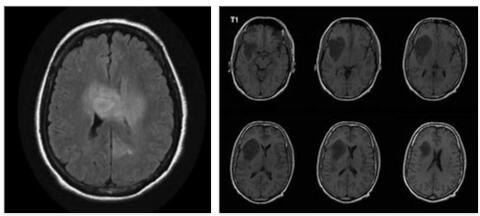Hunter glossitis is characterized by a change in the tongue caused by a lack of vitamin B12. It is usually just a symptom of an underlying disease. It is treated as part of the therapy for the underlying disease.
What is Hunter glossitis?
According to abbreviationfinder, hunter glossitis belongs to the large area of diseases of the body of the tongue, which is covered by the collective term glossitis. It is characterized by a burning, smooth and lacquered red tongue. It is just a symptom of another underlying condition.
This symptom is also known under the names Möller-Hunter glossitis or Möller glossitis. Originally, Hunter glossitis was only mentioned in connection with the so-called pernicious anemia. Here it is merely an accompanying symptom.
Today, however, this term is used more generally when describing various diseases such as iron deficiency anemia, avitaminosis, folic acid deficiency, beriberi or other systemic diseases. In all of these diseases, a lack of vitamin B12 leads to the typical features of Hunter glossitis.
The disease was first described in 1851 by Julius Otto Ludwig Möller, a German surgeon. Independent of this, there is a description by the Scottish doctor William Hunter from 1900.
Causes
The root cause of Hunter glossitis is vitamin B12 deficiency. Vitamin B12 performs important functions in the organism. It plays an outstanding role in cell growth, blood formation, cell maturation and the overall metabolism of amino acids, fats and carbohydrates. A vitamin B12 deficiency can have several causes.
It must be noted that this vitamin is stored in the liver, whereby a direct deficiency becomes noticeable after about two years at the earliest. Vitamin B12 is particularly found in animal products, mainly in the liver. Vegans or vegetarians can therefore develop a vitamin B12 deficiency over time.
But there are also diseases that prevent the absorption of vitamin B12 in the intestine. The best-known example is pernicious anemia. The so-called intrinsic factor ensures the absorption of this vitamin in the intestinal mucosa. In the absence of this factor, the body can no longer absorb vitamin B12. Blood formation and cell division processes are disturbed. Severe anemia occurs, which is associated with other symptoms, including a change in the body of the tongue.
The intrinsic factor is produced in the duodenum ( duodenum ) and can fail in the case of stomach and small intestine diseases. It can also be destroyed by autoimmune reactions against the intrinsic factor. Other causes of vitamin B12 absorption disorders are malabsorption in celiac disease, alcoholism, bacterial overgrowth of the large intestine, fish tapeworm.
An increased need for vitamin B12, genetic preconditions, increased formation of nitrogen monoxide or displacement by chemically analogous drugs are also possible triggers. A latent vitamin B12 deficiency can also occur during pregnancy. In all of these conditions, the development of Hunter glossitis is also possible.
Symptoms, Ailments & Signs
Hunter glossitis is characterized by an intense burning sensation in the mouth and especially on the tongue. The tongue appears red, smooth and varnish-like, especially on the tip or on the back of the tongue. Speaking and chewing are very difficult.
The tongue mucosa contracts due to the delayed cell division processes. This feature is also called atrophy of the tongue mucosa. However, glossitis does not occur in isolation, but is an accompanying symptom of an underlying disease.
However, it is also possible that this symptom dominates over all other symptoms and is therefore perceived as a single symptom. Hunter glossitis can be clearly distinguished from other forms of glossitis. Blisters, canker sores or whitish coatings on the tongue are missing.
Diagnosis & disease progression
The diagnosis is always based on the typical characteristics and in connection with the possible underlying diseases. In terms of differential diagnosis, Hunter glossitis must be differentiated from bacterial and viral infections, mechanical influences from teeth or dentures, toxic effects from alcohol or nicotine, the so-called raspberry tongue in scarlet fever or other diseases.
When should you go to the doctor?
If the characteristic burning sensation in the mouth occurs, a doctor should be consulted. Other signs of Hunter glossitis that require evaluation are speech disorders and a red, varnish-like tip of the tongue. In addition, there is atrophy of the tongue mucosa, sometimes associated with a rash in the mouth. The causative vitamin B12 deficiency can also cause other symptoms. Tiredness and exhaustion, dizziness and a general decrease in mental and physical performance are typical.
If these signs appear, you must speak to your family doctor immediately. People who suffer from a vitamin B12 deficiency due to malnutrition are particularly susceptible to Hunter glossitis. Vegetarians and vegans should pay particular attention to any symptoms and complaints and, if in doubt, speak to a specialist. The same applies to people who suffer from chronic diarrhea or another chronic disease that may result in a vitamin B12 deficiency. If the symptoms are severe, a visit to the hospital is indicated. Sick people should also speak to their family doctor and a specialist in internal medicine and have the cause of Hunter glossitis clarified beyond a doubt.
Treatment & Therapy
Treatment for Hunter glossitis depends on the underlying cause. First, the cause of the vitamin B12 deficiency must be found. If this is diet-related, vitamin B12 can easily be supplied through dietary supplements. Multiple intramuscular injections per year are also possible.
The symptoms of Hunter glossitis quickly disappear in these cases. However, it becomes more difficult if the vitamin B12 deficiency is due to absorption. This can be checked by the so-called Schilling test, in which radioactively labeled vitamin B12 is administered and the amount excreted in the urine is examined.
Since the resorption disorders are caused by a variety of causes, the underlying disease must be identified and treated. Increasing the oral dose to 1000 times the normal intake has also proven effective. For example, instead of microgram amounts, milligram amounts can be administered in order to avoid a permanent injection. However, the administration of vitamin B12 together with folic acid is always important.
Outlook & Forecast
Hunter glossitis is a consequence of an existing health impairment and is not an independent disease. Therefore, the prognosis depends on the curability of the causative disease. The trigger for the change in the tongue is a lack of B12. If this is caused by an alcohol disorder, the severity of the addiction and the patient’s willingness to cooperate must be considered for a prognosis. If the sufferer manages to break the addiction to alcohol, there is a good chance that Hunter glossitis will be relieved. If you relapse into alcohol consumption, the body of the tongue changes again. In addition, the risk of premature death increases, since the organism is weakened overall and organ damage occurs.
If the vitamin deficiency is triggered by another liver disease, the curability of the organ damage is also decisive for improving health. In some cases, only a liver transplant can lead to a change. The surgical procedure is risky. In addition, the donor organ must be accepted by the organism. If treatment is successful, there is a good chance that Hunter glossitis will be relieved. Lifelong health monitoring is necessary so that by monitoring physical functions and blood values, you can react as quickly as possible to abnormalities. A change in lifestyle must also be expected.
Prevention
Since Hunter glossitis is due to a lack of vitamin B12, prevention concerns all measures that prevent this vitamin B12 deficiency. A balanced diet should provide sufficient vitamin B12. A healthy lifestyle and avoiding alcohol and smoking are also important to prevent diseases that can trigger Hunter glossitis.
Resorption disorders caused by genetics can be compensated for by adjusting the diet. For example, only gluten-free foods may be consumed if you have celiac disease.
Aftercare
After the Hunter glossitis has been treated causally and symptomatically, no further symptoms usually arise. Typical symptoms such as burning and stinging in the area of the tongue and the characteristic itching on the tip of the tongue subside within a few days. Follow-up care includes a final follow-up check by the responsible doctor.
The medic will perform a physical exam. As part of an anamnesis, he asks the patient about any complications and the general course of the disease. Finally, a gentle pain reliever, such as aspirin, may be prescribed if a slight burning or tingling persists. If the course is positive, no further visits to the doctor are necessary.
However, the patient should pay attention to any warning signals from the body and inform the doctor about them. Further follow-up measures focus on cooling the tongue for a few more days and maintaining the change in diet. Spicy or other particularly irritating foods should initially be avoided after Hunter glossitis.
Better are bland foods and chamomile or lemon balm tea. Homeopathic remedies such as sage extracts or aloe vera can be used to eliminate itching. If the atrophy is caused by a serious illness, the necessary follow-up measures must be discussed with the specialist after recovery.
You can do that yourself
The measures that Hunter glossitis patients can take themselves depend on the cause of the symptoms. If there is a nutritional deficiency of vitamin B12, the B vitamin can usually be supplied by changing the diet. In severe cases, dietary measures must be supported by dietary supplements or an intramuscular injection.
If the vitamin B12 deficiency is due to a serious illness, this must first be determined. The person concerned can support the medical diagnosis by keeping a complaint diary and recording any symptoms and abnormalities in it. For most causes, medical treatment is indicated, which can be supported by those affected by rest and bed rest.
After the underlying condition has been treated, Hunter Glossitis usually goes away as well. A prerequisite for a longer-lasting healing success is a change in the lifestyle that triggered the underlying disease. In general, a healthy lifestyle is recommended. Hunter glossitis patients should exercise regularly, avoid stress and avoid stimulants such as alcohol and cigarettes if possible. In addition, regular check-ups are recommended. In this way, a renewed illness can be detected early and treated in a targeted manner.



